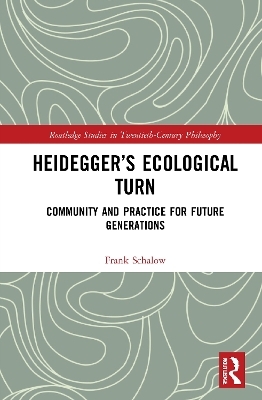
Heidegger’s Ecological Turn
Community and Practice for Future Generations
Seiten
2021
Routledge (Verlag)
978-1-032-04836-9 (ISBN)
Routledge (Verlag)
978-1-032-04836-9 (ISBN)
This book makes explicit the ecological implications of Martin Heidegger. It examines how the trajectory of Heidegger’s thinking harbors an "ecological turn," which comes to the forefront in his attempt to anticipate the impending crisis precipitated by modern technology.
Schalow’s emphasis on such key motifs as stewardship, dwelling, and "letting be" (Gelassenheit) serves to coalesce the problem of freedom in a new and innovative way, in order to expand the interpretive or hermeneutic horizon for re-examining Heidegger’s philosophy. By prioritizing a response to today’s environmental crisis and the possible impact upon future generations, the author traverses a divide within Heidegger scholarship by developing a deeper, critical outlook on his philosophy—without either reiterating standard interpretations or rejecting them wholesale. He develops a trans-human approach to ethics, which, by prioritizing the welfare of the earth, nature, and animals, counters the anthropocentric bias and destructive premise of modern technology.
Heidegger’s Ecological Turn will be of interest to Heidegger scholars and researchers working in phenomenology, hermeneutics, continental philosophy, and environmental philosophy.
Schalow’s emphasis on such key motifs as stewardship, dwelling, and "letting be" (Gelassenheit) serves to coalesce the problem of freedom in a new and innovative way, in order to expand the interpretive or hermeneutic horizon for re-examining Heidegger’s philosophy. By prioritizing a response to today’s environmental crisis and the possible impact upon future generations, the author traverses a divide within Heidegger scholarship by developing a deeper, critical outlook on his philosophy—without either reiterating standard interpretations or rejecting them wholesale. He develops a trans-human approach to ethics, which, by prioritizing the welfare of the earth, nature, and animals, counters the anthropocentric bias and destructive premise of modern technology.
Heidegger’s Ecological Turn will be of interest to Heidegger scholars and researchers working in phenomenology, hermeneutics, continental philosophy, and environmental philosophy.
Frank Schalow is Professor of Philosophy and University Research Professor at the University of New Orleans, USA. He is the co-editor of Heidegger Studies and the author of numerous books including the Historical Dictionary of Heidegger’s Philosophy, 3rd edition (2020), Toward a Phenomenology of Addiction: Embodiment, Technology, Transcendence (2017), and Departures: At the Crossroads between Heidegger and Kant (2013).
Preface
Introduction
1. Seeking New Guidelines for Interpretation
2. A New Leaping-Off Point for Ethical Inquiry
3. The Global Stage of Politics and the Return to the Earth
4. Temporality, Freedom, and Place
5. The Turn toward Stewardship: Is a Socio-Biotic Community Possible?
| Erscheinungsdatum | 07.09.2021 |
|---|---|
| Reihe/Serie | Routledge Studies in Twentieth-Century Philosophy |
| Verlagsort | London |
| Sprache | englisch |
| Maße | 152 x 229 mm |
| Gewicht | 412 g |
| Themenwelt | Geisteswissenschaften ► Philosophie ► Ethik |
| ISBN-10 | 1-032-04836-0 / 1032048360 |
| ISBN-13 | 978-1-032-04836-9 / 9781032048369 |
| Zustand | Neuware |
| Informationen gemäß Produktsicherheitsverordnung (GPSR) | |
| Haben Sie eine Frage zum Produkt? |
Mehr entdecken
aus dem Bereich
aus dem Bereich


